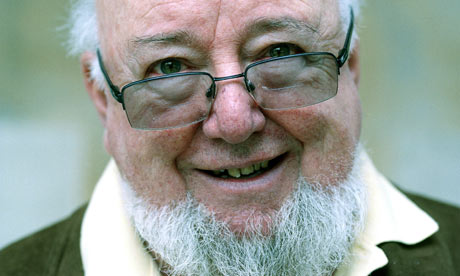
Thomas Keneally says in his excellent new memoir, Searching For Schindler, that when he was doing his early research for Schindler's Ark, "It became apparent that if one looked at the Holocaust using Oskar Schindler as a lens, one got an idea of the whole machinery at work on an intimate scale and, of course, of how that machinery made its impact on people with names and faces. A terrible thing to say – but one was not defeated by sheer numbers."
In other words, Schindler's Ark is a book which demonstrates that behind the statistic of six million Holocaust deaths, there are six million personal tragedies. More, indeed, if we count all the people who lost their friends, lovers, sisters brothers, parents, grandparents and – God help us – children.
I'm ashamed to say that it's precisely for that reason that I put off reading the 1982 Booker winner for years. I found intimate terror in Primo Levi and Sophie's Choice so depressing that I avoided similar material – until this blog series reached Schindler's Ark. My reasoning was deplorable, both in terms of moral weakness and because (as I am perhaps one of the last people on earth to discover) Schindler's Ark is actually one of the most uplifting books you could hope to read. In spite of everything.
For the benefit of those wallowing in the same kind of ignorance as I was, Oskar Schindler is a man who offered, in Keneally's words, "an acre of safety in that square mileage of horror" and saved more than 1,000 Jews from the death camps.
Keneally doesn't flinch from this horror. He has, in fact, an eye for detail that will break your heart. A suitcase out of which tumble "gold teeth still smeared with blood". A 10-year-old girl who "carried her terror unsupportably, the way adults will, unable to climb on to a parental chest and transfer the fear." A female prisoner who provides weekly manicures for a camp commandant. These sessions resemble the ones that she used to give in the Hotel Cracovia before the war, right down to the polite small talk. The only major difference is that the commandant always sits with a loaded revolver at his elbow. One day she asks why it is there. "In case you ever nick me," he tells her.
I could pick out any number of similar brushstrokes that show the repulsive darkness of the Holocaust. But the triumph of this book is that it also shows the light in its masterful portrait of Oskar Schindler.
This man was a womaniser, a heavy drinker, an enthusiastic black marketeer, an unrepentant capitalist who made his fortune in the war and, most surprising, a long serving member of the Nazi party. Yet when all around him had gone insane, he insisted on decency and risked his life his fortune to turn the factories he owned into the ark of the book's title. He claimed the Jews who worked in them were skilled labourers doing essential war work (even when some women he rescued from Auschwitz were too weakened to do anything other than knit – for themselves). He tricked, bullied and bribed the SS into leaving them alone and he fed them at enormous expense from the black market.
It's a mark of Keneally's storyteller's gift that he conjures a man we can love as well as admire and the story he tells is little short of remarkable. The most heartening thing about it, is that, give or take a bit of dialogue and creative scene-setting, it adheres strictly to historical records. Indeed, the author states in his introduction that he "attempted to avoid all fiction". A declaration that caused some confusion when he won the Booker prize – for fiction.
The point seems moot when set against the achievement of the book as a whole. True, it relies on fact. True also, if looked at in strictly literary terms, the book presents a few problems. Astonishingly for a work that has sold so many copies, quite a few of its sentences are garbled (admittedly more the copy-editor's fault than Keneally's). A few plot lines also disappear. Early on in the book, for instance, we are told that Schindler is a spy for German counterintelligence and that this earns him some leeway as he is setting up his factory haven. But this fact is quickly forgotten and never mentioned again.
Yet, the real measure of Keneally's creative talent is that any such problems are immediately forgiven as he sweeps us up in his story and the pleasure of Schindler's company. It's one thing to sift through historical documents and testimonies. It's another to bring them to life as he has here. Who cares if it's faction or fiction? It's a book everyone should read. Since the Booker prize demonstrably furthered that aim (legend even has it that Spielberg got on the phone the day after the ceremony), it's impossible to begrudge its victory.

